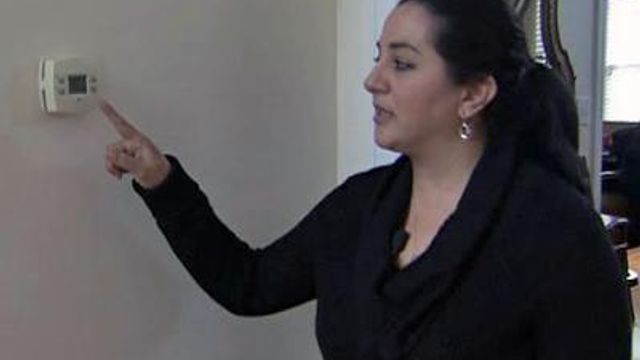Cold makes heating bills rise
A two-week cold snap in North Carolina froze everything but residents' heating bills.
Between Jan. 2 and Jan. 12, Raleigh saw its coldest stretch of weather since 2000. The average temperature those days was less than 34 degrees.
Some residents said their heating bills doubled or tripled during that time period.
Homeowner Sue Treish's utility bill normally runs between $100 and $200. This month, her bill from Progress Energy was $568.
"I about flipped out," Treish said.
She and her neighbors talked, and all of them noticed that their bills had increased significantly. Homeowner Mari Keith's bill jumped from $168 to $342.
"I couldn't believe it. I opened it, and I thought, 'Oh, there must be a mistake,'" Keith said.
Progress Energy spokesman Mike Hughes said the cold is the only reason for those bill increases.
"The rates have not changed or gone up. Energy use is solely responsible for the higher energy bills that customers are seeing," Hughes said.
Get more tips on saving energy during cold weather.
Many customers kept their thermostat at the same temperature during the recent cold snap, he said. But the colder it is outside, the more it costs to keep the temperature inside residences from dropping.
"Set your thermostat between 68 and 70 degrees during the day. Lower it at night when you're able to get in bed and get under blankets," Hughes said.
He also recommended keeping vents clear from furniture and drapes, changing filters monthly and lowering the thermostat when no one is home.
Learn more about energy efficiency.
Progress Energy also offers established customers the option of averaging their yearly bill and paying the same amount each month. The company funds the Energy Neighborhood Fund, which helps people pay their energy bills. For information, call the CARELINE at 1-800-662-7030 or contact your local social services department.
Customers who have trouble paying their bills should contact the energy company directly to make arrangements before they receive a disconnection notice.
Hughes noted that state law forbids utilities from disconnecting a customer while the temperature is below freezing.
Find out about programs to help pay your energy bill.
For now, homeowners including Treish and Keith said they have a big bill to worry about.
"We're going to have to pay it, of course, because we need our electricity," Treish said. "But because we are going to pay it, things will be tight for a while."










